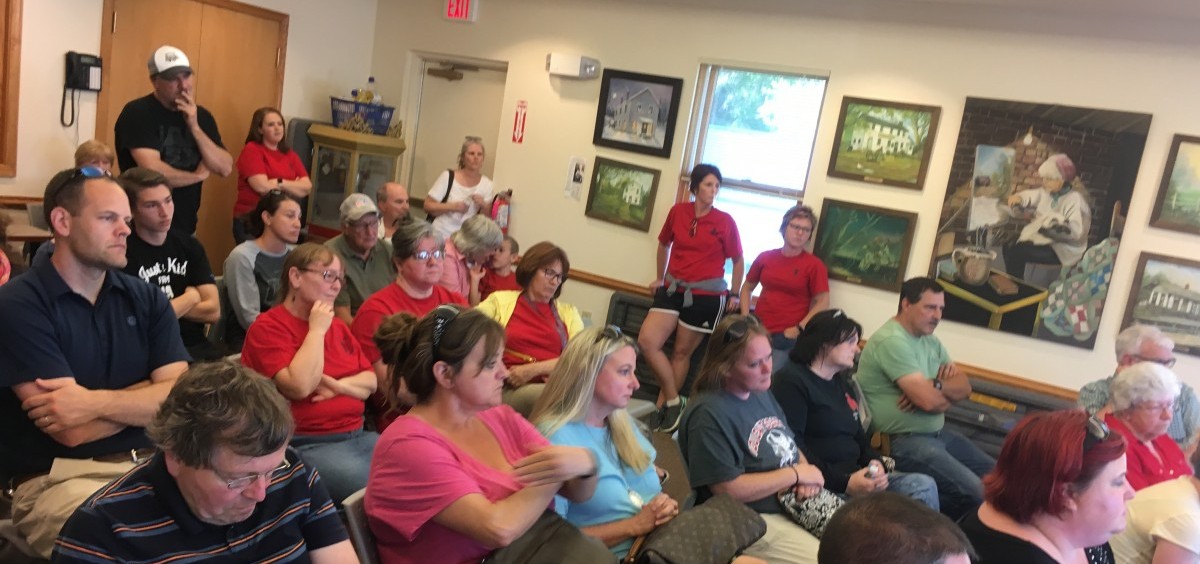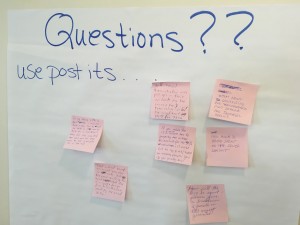News

Alexander Schools Sees Levy As Lifeline
< < Back to ?p=188422Once again, the Alexander Local Schools District is asking voters to approve the continuous 1.5 percent earned income tax operating levy.
The proposal was voted down in November but the district’s school board president, Fred Davis, says there’s no choice but to go back to the voters.
“Basically, what we’re saying is expenditures are outrunning revenue. If it doesn’t pass this Tuesday, that need doesn’t go away and it boils down to at what level do you want to fund your schools and educate your kids,” Davis said. “All we have to cut is basically personnel and transportation and when you do that – at some point the kids suffer.”

At a recent levy forum at the Wells Public Library in Albany, Lindy Douglas, superintendent of Alexander schools, reminded the crowd that this deficit should come as no surprise because the previous 5-year financial forecast for the district made it clear that the need for an infusion of cash to meet expenses would be inevitable. The district includes portions of Athens, Meigs, and Vinton counties.
It’s been 26 years since the last Alexander schools measure was approved.
“No one likes to pay more taxes – but in this state that’s the way schools are funded and we have very little choice. We don’t sell a product, we can’t raise our prices and recoup costs. ” – Fred Davis, president, ALS school board
About 50 people attended the levy forum. The audience included those who say the tax will cause them financial hardship and others who see the measure as an investment in the future of the Alexander students.
A district resident who works in Athens expressed a common complaint about being taxed twice based on where residents live and work.
Athens charges a 5 percent tax for anyone working in the city, but any tax that benefits a particular school district is specific to the worker’s home address. Pensions, disability, social security, investment payments, etc., are not considered earned income. Taxpayers who itemize their income can have the district’s earned income tax deducted from their federal tax return.
TAXING INVESTMENT?
A question that has dogged the board as try to sell the levy to residents is the district’s investment in the Alexander Wellness Center that’s being built on the schools’ campus. Administrators stressed that between private donations and fundraising, the district made a solid investment when considering the benefits of having that extra recreation space and doctors on campus.
About $2.5 million is budgeted for the new Wellness Center, according to the district. The space is set to include two basketball courts, an indoor track and space for other recreational activities.
Holzer Clinic is also leasing a portion of the facility.
Douglas added that the district’s chief financial officer, Aaron Schirm, “ran the numbers and with or without the structure, or the payments from Holzer Clinic,” and the district would still need financial help to keep up with basic needs. Davis believes the Wellness Center will help promote healthy lifestyle choices, like fighting the opioid epidemic, noting school systems are now called upon to do more than just teach academic lessons, “We’ve got two different demographics here, we got some of our older folks who still go by the basic function of the school district and younger folks who want more and more programs.” It took a parent in the audience to help move others off of the subject with the suggestion to, “… have a separate meeting about should we have done this or should we not have done this, let’s debate the past – that’s fine but as far as this levy is concerned, [the center] has no effect on it whatsoever.
“This levy is to pay the bills – the bills aren’t going to go down, so why should the levy?” – Lucy Juedes, children attend Alexander Local Schools
When asked why there was no expiration date on this levy, board members stressed that considering state budget cuts, the standing poverty assistance formula, and mandates, the earned income tax is needed to help the district meet it’s basic operating costs – and because that need will always be there it wouldn’t make sense to keep asking for renewals.
The proposed operating levy can be used, in accordance with state treasury department guidelines, to cover costs for salaries, learning materials, utilities, insurances, gas, extracurricular activities, etc.
Lucy Juedes, a parent with children in the district, is concerned that the district will continue to cut educational programs and fall behind Athens City School District students if voters reject the levy again, “Whether you have kids who are fast learners, kids who are slow learners, I have both. Kids who have special needs, all kinds – kids in wheelchairs, all kinds, if this levy does not pass Alexander will no longer be competitive.”
The failure of the November attempt and the lack of additional support from Kasich’s state funds, has already led to cuts for the upcoming school year for the district:
- Personnel: 1 teacher, 1 library aide position, and 2 non-certified positions
- Programs: $105,000 in reading and pre-school programs
- Technology: $50,000
- Transportation: 2 buses will not be purchased and 1 route will be cut
But with the stakes as high as they are for the district, Davis said all the district can do is ask for help.
“I’m a firm believer in people voting the way they feel – I’m not here to try to sway anybody’s vote as far as I’m here to say, ‘we got a need,'” Davis said. “We can talk about replacing the school board, administration… we can do that tomorrow – but the need doesn’t change. And to make those cuts… they only people that suffer – those are the kids.”
You can compare Alexander’s request with other Ohio school district tax levies currently in place here.

